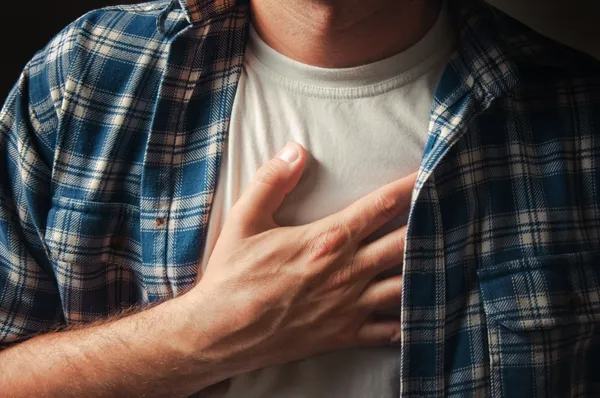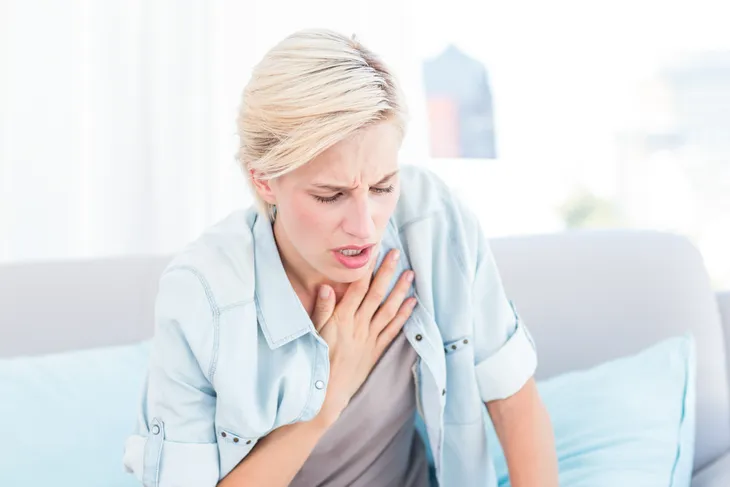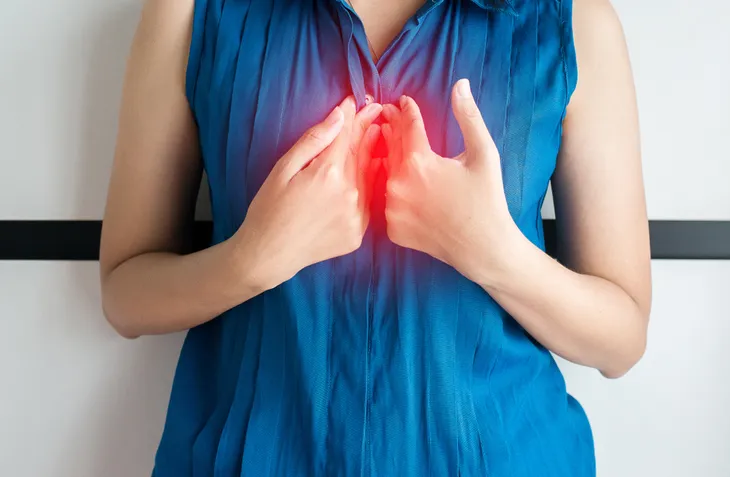Heart disease is the number one killer of both men and women in America—with approximately 460,000 related deaths due to a sudden and unforeseen heart attack. Of those who die, almost half suffer an attack so suddenly that they don’t have time to call an ambulance or get to a hospital.
When we think of a heart attack, most of us picture someone clutching their chest and falling to the ground. While this is how a heart attack happens on the big screen, it isn’t necessarily an accurate depiction of how a heart attack actually occurs. There are many other signs and symptoms people can experience, especially women. Here are 15 early warning signs to look out for…
1. Sweating
Leading up to a heart attack, many patients notice profuse, cold sweating without any exertion or apparent reason. Your clothes and skin may become soaked in cold sweat, and your face may turn pale or white as a sheet. When your arteries are clogged, it can take more effort for your heart to pump blood through them. As a result, your body will try to maintain a safe temperature, causing you to sweat from the extra effort by your heart.
Excessive sweating can also be a sign of heart problems, not just a heart attack. You could experience this both during the day and at night. If you’re sweating a lot and you aren’t exercising or doing something that requires exertion while it happens, it could be because of your heart. Even if you aren’t having a heart attack, this symptom should be taken seriously. Go to your doctor so he or she can run tests that can eliminate or identify the cause of sweating.
2. Restricting Feeling
We all know it’s common for someone having a heart attack to have pain and numbness shooting down their left arm. But what a lot of people don’t know is that the pain and discomfort can travel to other areas of your body. Some heart attack survivors have said they experienced feelings of suffocation prior to a heart attack. They’ll feel a restriction around the upper back and torso as pressure builds. It’s almost as if a rope is being squeezed around the body and pulled tight. You could experience this sensation in your jaw and throat as well.
Feelings of restriction could also be a sign of angina pectoris, an extremely painful condition that causes symptoms similar to that of a heart attack. Angina can be a prelude to a heart attack, so if it doesn’t go away within 15 minutes or you have episodes regularly, you should see your doctor. In some cases, it may be best to go straight to the emergency room or to call an ambulance.
3. Fatigue
Oftentimes, during the weeks before a heart attack, individuals will have a gradual feeling of fatigue set in, which starts as a slow drain on energy and becomes complete exhaustion a few days prior to the heart attack (i.e., bending down to tie your shoes may even be too tiring). It’s easy to write off fatigue as a result of lack of sleep, disrupted sleep, a busy schedule, or even stress which is why most people wouldn’t consider it to be a warning sign of a heart problem and future heart attack.
According to the American Heart Association (AHA), tiredness and fatigue from doing regular, everyday activities like shopping or walking can be a symptom of heart failure (the heart’s inability to pump enough blood to where it needs to) and less blood is sent to areas like your muscles, ultimately causing muscle weakness and fatigue.
4. Shortness of Breath
Many folks, particularly women, describe a feeling of breathlessness in the days or moments before a heart attack. It might be so severe that you are unable to even carry on a normal conversation without feeling short of breath. While the AHA explains that shortness of breath most commonly happens when you’re doing some form of activity, it can also occur when you’re resting or sleeping. It could even wake you up from sleep if the shortness of breath is severe.
Put simply, the cause of this symptom is related to the process of returning blood to the lungs from the heart. When this process isn’t functioning properly, fluid can leak into the lungs and cause shortness of breath. It can be very scary to experience sudden shortness of breath, and if there’s no reason for your trouble breathing (e.g., running 5 miles), you should get to the hospital as soon as possible.
5. Flu-Like Symptoms
Many people who suffer a heart attack say that they thought they had the flu due to suffering flu-like symptoms leading up to their attack, including indigestion, nausea, bloating, coughing and diarrhea which may be excused as “just the flu.” These are other dangerous symptoms that if recognized early on as a potential heart-related issue could help improve your chance of recovery and survival.
There are a number of reasons you could experience flu-like symptoms when you’re having a heart attack. Some of them include that your digestive system is not getting enough of what it needs to function properly (blood), and fluid building up in the lungs. Knowing these signs, specifically the not-so-common ones, is the best way to protect yourself and those around you. Don’t just throw your concern away and excuse your symptoms, no matter what they are, doing so could save your life.
6. Dizziness
Oftentimes, patients also complain of lightheadedness prior to a heart attack. Individuals will feel dizzy, like they’re about to pass out, and some even faint! This symptom could be dangerous for more than your heart, because fainting could cause you to hit your head when you fall or even break some bones.
When you’re very dizzy, enough so that you feel like you might not be able to walk properly, sit down and call someone for help. Even if the dizziness ends up passing, it shouldn’t be ignored, and you should consider if you’re displaying other signs or experiencing any other symptoms of a heart attack. And remember, you don’t need to be feeling all of the most common and well-known symptoms, such as pain down the left arm, to be having a heart attack or heart problems. Go to your doctor or the emergency room if the dizziness is severe, if you have fainted, or if you’re experiencing additional symptoms.
7. Anxiety
A sudden onset of stress so severe that it causes an anxiety attack is common in heart attack sufferers. Some even explain it as a feeling of impending doom setting in without any apparent reason, which is actually the body trying to get your attention that something is wrong. One of the difficulties with anxiety being a symptom of a heart attack is that it can mimic a heart attack, and anyone who has experienced an anxiety attack knows that the pain and severe stress are very real. As your heart beats faster from the anxiety, you can experience heart palpitations.
Heart attacks and anxiety attacks are often distinguished by the pain (severe and common for heart attacks) and the fast beating of the heart from anxiety. You can experience some pain but the focus from anxiety is on the heartbeat). That said, distinguishing between the two can be next to impossible for the person suffering the anxiety or heart attack, because it can consume you, making you unable to focus or concentrate on what’s happening to your body.
Improve your heart health in just five days! Sign up for our newsletter to receive our daily heart health checklist.
8. Insomnia
Almost 50-percent of heart attack patients (mainly women) complain of an inability to fall asleep in the days prior to suffering a heart attack. Other symptoms of insomnia include waking often and having poor quality of sleep. Insomnia can strike for weeks in advance of an attack.
In addition to insomnia being a precursor to a heart attack, research suggests that insomniacs have a much higher risk of having a heart attack than those who typically have no trouble sleeping. According to a study published in Psych Central, the risk of heart failure triples when people experience at least three insomnia symptoms simultaneously. These serious symptoms include trouble falling asleep and staying asleep, or not feeling refreshed in the morning. It is unclear at this point how insomnia is linked to heart failure, but researchers are confident there is a strong link.
9. Chest pain
Chest pain leading up to a heart attack can range from mild to severe (feeling like a weight is on the chest). However, most often it’s experienced in the breastbone, one or both shoulders, and upper back, but not always in the actual area of the heart. The Mayo Clinic explains that this pain can vary and usually feels like one of the following: tight ache, pressure, fullness, or squeezing in the chest. The pain may radiate to other areas of your body.
Chest pains are the most recognizable symptom and likely the symptom most people think of when they think about heart attacks. Although this is a common symptom, not all people who have heart attacks experience it. Sometimes it’s difficult to distinguish between chest pain being a sign of a heart attack or heartburn because they can feel very similar. But it’s better to be safe and get checked out than assume that you just have heartburn. If you or someone around you complains of severe chest pain or other form of discomfort in their chest, call 9-1-1.
10. Pain in Other Areas
Discomfort or a mild tingling sensation in areas such as the stomach, back, neck, jaw, and most typically in one or both arms (in the upper shoulder area) is very common prior to a heart attack. You could even experience pain in your teeth! While most people recognize chest pain as a symptom of a heart attack, they generally don’t know that pain in other areas can be a sign as well.
Surviving and recovering from heart attacks depends on a variety of factors, including your medical history, age, gender, and genetics. And in a lot of cases, how quickly you get treatment or head into surgery to unblock your arteries can greatly impact the outcome of your heart attack. Knowing the signs and symptoms, especially the early warning signs that can begin days before an attack, is your best protection, and this knowledge could even save someone’s life.
11. Nausea
While chest pain is still the most common symptom of a heart attack, the AHA lists several others that are also likely to occur, especially in women. Nausea is a big one, along with vomiting, lightheadedness, fainting, or dizziness.
Unfortunately, because nausea is a common side effect of many other conditions, most of which are less threatening than a heart attack, women tend to sweep it under the rug or chalk it up to something else, especially if they aren’t feeling that signature chest pain alongside the nausea. “Even though heart disease is the No. 1 killer of women in the United States, women often chalk up the symptoms to less life-threatening conditions like acid reflux, the flu or normal aging,” says American Heart Association.
12. Heartburn and/or Indigestion
Similar to nausea, heartburn and indigestion are among the symptoms that people generally don’t associate with a heart attack, which causes them to ignore the signs. As MedicineNet.com points out, these symptoms, along with belching and burping can be experienced during a heart attack.
Again, women are the more likely targets of this confusing symptom associated with heart attacks. “Sometimes belching or burping can accompany the nausea, and some patients have described a feeling like indigestion associated with a heart attack. Women are more likely than men to report these less typical symptoms of heart attack, and some patients have described feeling as though they are developing the flu,” says MedicineNet.com.
13. Silent Symptoms
The only thing more terrifying than experiencing symptoms of a heart attack, is having a heart attack without any of the symptoms to alert you that something is wrong. When a heart attack occurs without any symptoms, “It’s called a silent heart attack, or medically referred to as silent ischemia (lack of oxygen) to the heart muscle,” according to Go Red for Women. Richard A. Stein, MD, a cardiologist who works at the New York University Langone Medical Center, explained to WebMD that “almost 15% of patients have no symptoms, so they never know they’re having a heart attack. That’s more common in elderly people and those with diabetes.”
Go Red for Women expands on this with input from Deborah Ekery, MD, a clinical cardiologist at the Heart Hospital of Austin and with Austin Heart in Austin, Texas, who said that the people who experience no symptoms, are likely experiencing very subtle or non-specific symptoms, such as indigestion, muscle strain, prolonged fatigue, or flu-like symptoms which is why they might say they had no symptoms at all. “Those are some of the less specific symptoms for a heart attack, but ones that people may ignore or attribute to something else,” said Ekery.
14. Jaw Pain or Toothache
When we think of a heart attack, we typically think of pain in the chest. But what most people might not know is that, once that chest pain presents itself, it can spread and affect other areas of the body, such as the neck, jaw, shoulder, arms and back.
People who’ve suffered from a heart attack have complained about jaw pain, and even reported tooth pain. Once again, according to the AHA, this type of heart attack-related pain is more common in women.
15. General Malaise
Shikhar Saxena, MD, a cardiologist who teaches at the University of Nebraska Medical Center, tells WebMD that heart attacks can not only happen with no symptoms, but also extremely “vague, non-specific symptoms, like you just don’t feel right, or having a feeling of impending doom.”
Unlike almost all the other symptoms on this list, this one isn’t physical, it’s more mental, but nonetheless just as important. Like any other symptom on this list, it’s the body’s way of alerting you that something is wrong. MedicineNet.com describes it as a “vague feeling of illness.” It also states that someone who experiences this might feel a general sense of unwellness, or like they are coming down with something. “Some people will experience severe anxiety or panic during the heart attack. This has been described as feeling a sense of doom, as one experiences with a panic attack,” said MedicineNet.com.


















